Key takeaways:
- Child lifestyle experiences shape growth through daily activities, social interactions, and responses to the environment.
- Mentoring fosters youth self-confidence, emotional resilience, and vital life skills, while also supporting mentors’ personal growth.
- Effective mentoring requires patience, adaptability, and active listening to break down communication barriers and set realistic goals.
- The mentoring relationship creates a network of support, empowering both youth and mentors through shared experiences and insights.
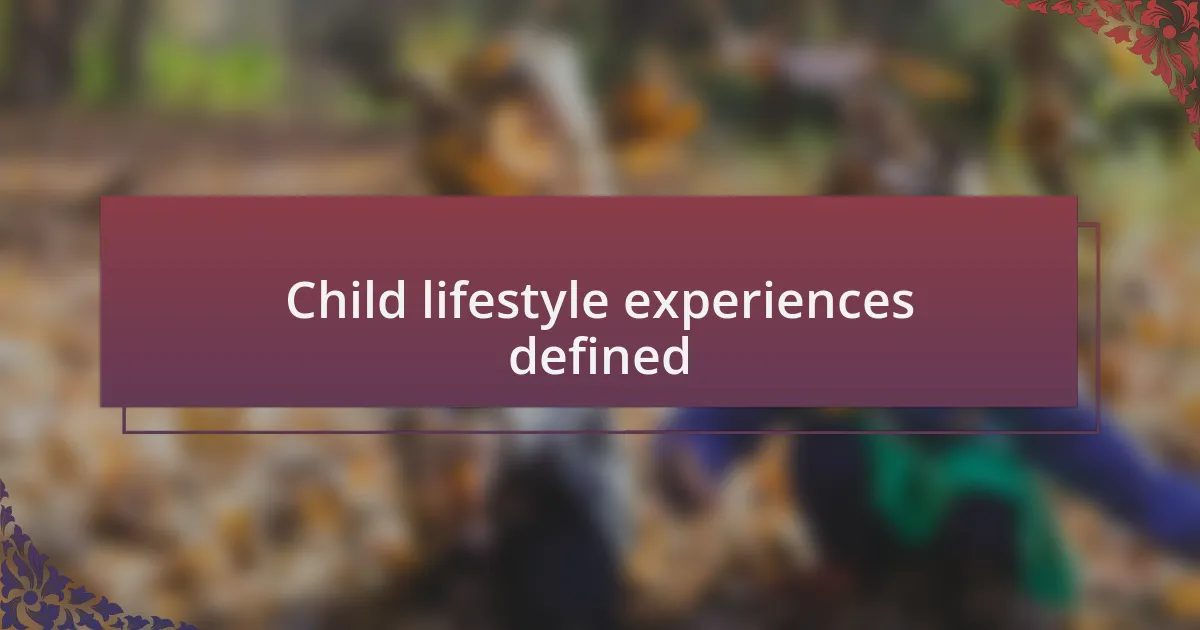
Child lifestyle experiences defined
Child lifestyle experiences encompass the daily activities, interactions, and environments that shape a child’s growth and development. I often reflect on a summer spent volunteering at a local community center, where I witnessed children form friendships while engaging in arts and sports. It’s incredible how these moments can create lasting memories and contribute to their sense of identity.
These experiences are not just about structured activities; they also include the way children observe and react to their surroundings. I remember walking through my neighborhood with a group of kids, and their curiosity sparked endless questions about everything from nature to community. Each question they asked was like a window into their understanding of the world, showing me just how vital these informal experiences are to their learning.
Furthermore, child lifestyle experiences vary widely depending on cultural, social, and economic factors. I can’t help but think about a young girl I mentored from a less privileged background. Her limited access to experiences outside her neighborhood left me pondering—how do we ensure that all children have equal opportunities to thrive? The richness of a child’s lifestyle can be a powerful tool for fostering resilience and creativity when nurtured appropriately.

Importance of mentoring youth
Mentoring youth plays a crucial role in shaping their future. During my time as a mentor, I noticed how some simple conversations could spark a child’s ambition. I often asked them what they dreamt of becoming. It was enlightening to see their eyes light up when envisioning possibilities, highlighting how important it is to guide them toward those aspirations.
One particularly impactful moment for me was when a young mentee shared her struggle with self-confidence. I realized that my encouragement wasn’t just about building her skills; it was about nurturing her belief in herself. The importance of mentoring often lies in those quiet moments, where we help youth recognize their unique strengths and potential.
Moreover, mentoring fosters a sense of belonging and support. In one session, we created vision boards together, and she found joy in realizing that her dreams were valid and achievable. By investing time in their aspirations, we not only prepare youth for future challenges but also help them cultivate a network of support. Isn’t that a fundamental need we all seek—someone who believes in us?
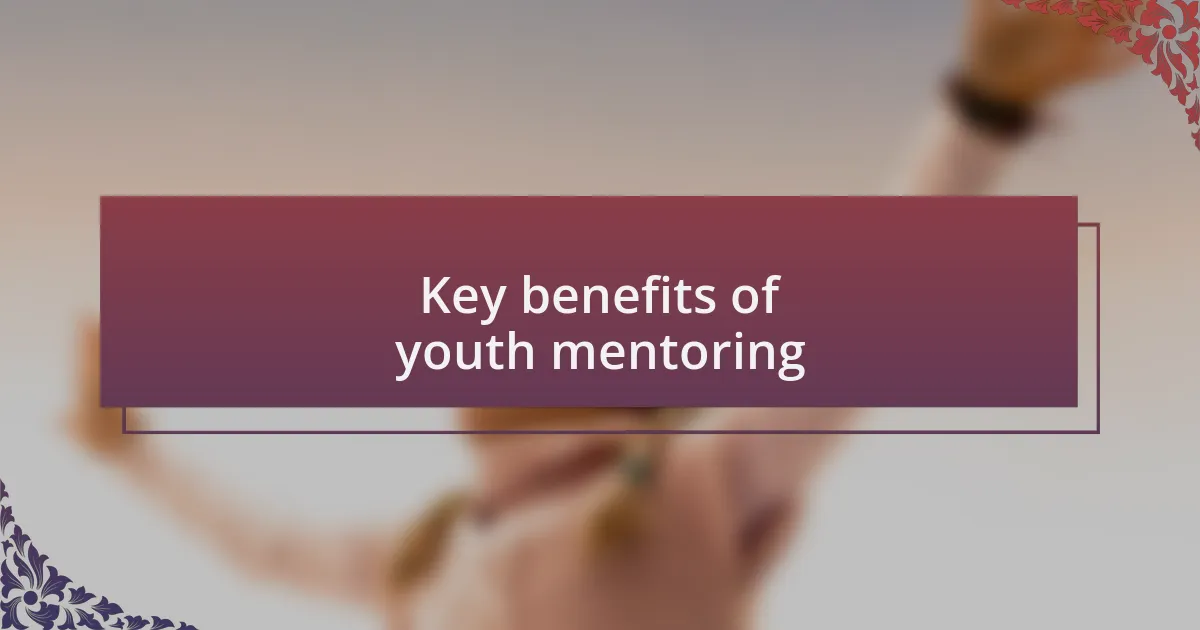
Key benefits of youth mentoring
Mentoring youth offers significant emotional benefits that often go unnoticed. I remember a time when a young mentee expressed feelings of isolation at school. By providing a listening ear and understanding her experiences, I saw her transformation from feeling alone to developing meaningful friendships. This highlights how mentoring can foster emotional resilience, allowing young people to navigate their social environments with greater confidence.
Another key benefit is the development of vital life skills. During our sessions, I would encourage my mentee to take the lead in planning activities or discussions. This not only built her organizational skills but also instilled a sense of accountability. Have you ever noticed how empowering it feels to take ownership of a project? Mentorship allows youth to experiment with responsibility in a supportive context, preparing them for future challenges.
Moreover, the mutual growth that occurs in a mentoring relationship is incredibly fulfilling. I often found myself reflecting on my own experiences as I worked with these young individuals. In one instance, a mentee offered a fresh perspective on a problem I had been grappling with, reminding me of the wisdom that youth can provide. Isn’t it amazing how knowledge flows both ways? Through mentoring, we create an enriching dialogue that benefits both the mentor and the mentee, fostering a deeper understanding of each other’s worlds.

Challenges in mentoring youth
One of the major challenges I faced while mentoring youth was breaking down communication barriers. In one instance, a mentee struggled to articulate her feelings during our discussions. I remember feeling frustrated at times, wondering how to reach her. This experience taught me that patience is crucial; sometimes, simply creating a safe space for dialogue is all that’s needed for youth to open up.
Another challenge lies in the differing expectations between mentors and mentees. Early in my mentoring journey, I expected a level of commitment and motivation that wasn’t always reciprocated. I often found myself asking, “Am I pushing too hard?” However, I realized that each young person comes with their unique set of motivations and life circumstances. Learning to be adaptable became essential in navigating these relationships.
Time constraints can also add to the difficulty of mentoring youth. Balancing my schedule with the needs of my mentee often felt like a juggling act. I’ll never forget the time when I had to reschedule our meeting multiple times due to conflicting commitments. It made me question whether I was doing enough. This taught me that flexibility and creativity are key; finding alternative ways to connect, like sending encouraging texts or sharing resources, can make a significant difference in sustaining the mentoring relationship.
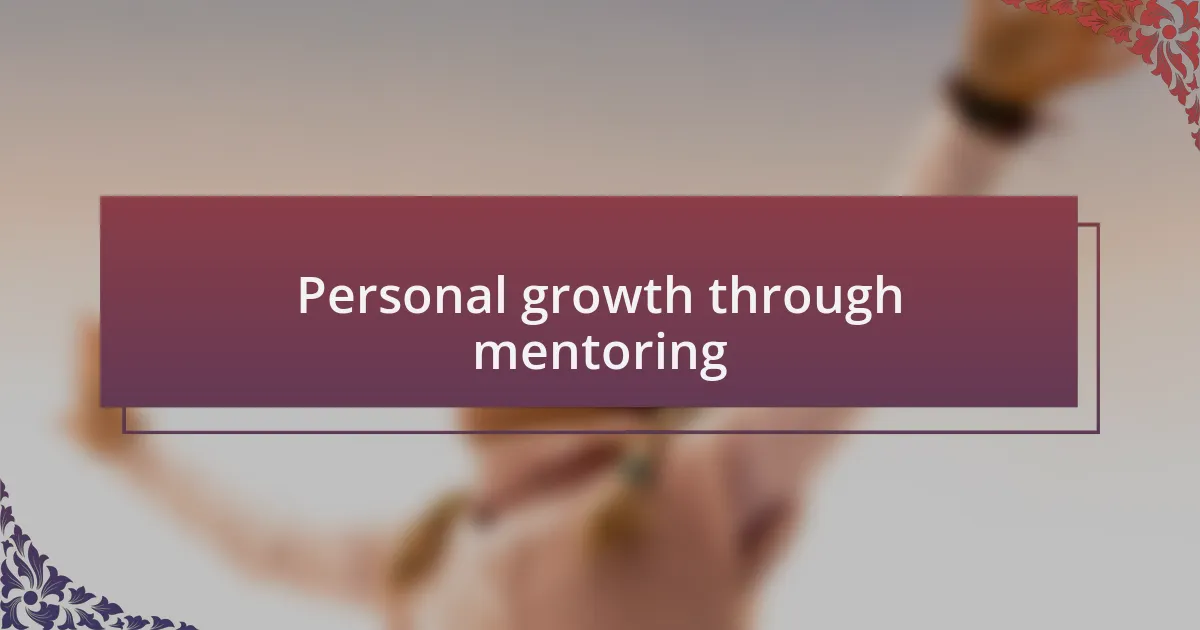
Personal growth through mentoring
One of the most surprising aspects of mentoring youth has been witnessing my own growth alongside them. There was a moment when a mentee shared her struggles with self-worth, and as I listened, I realized how often I had wrestled with similar feelings in my own journey. It struck me that mentoring is not just about guiding others; it’s a reflection of our own vulnerabilities and strengths. Have you ever found yourself inspired by someone you aimed to help? It’s a profound experience.
In another instance, I remember engaging with a particularly quiet mentee who often seemed disengaged. During a casual outing, she opened up about her dreams and fears, revealing insights that have reshaped my understanding of youth resilience. I felt a rush of gratitude; her courage created a newfound sense of purpose in my mentoring role. This interaction highlighted how, through the process, I developed greater empathy and active listening skills that influence all my relationships.
Mentoring has also reinforced the importance of setting realistic goals—not just for my mentees, but for myself as well. I often find myself reflecting on my goals and how they align with each mentee’s journey. One time, after organizing a small community project with my mentees, I felt a sense of fulfillment that had eluded me for years. It made me question: Am I prioritizing the right experiences in my life? That sense of purpose drives my personal growth in ways I never anticipated.
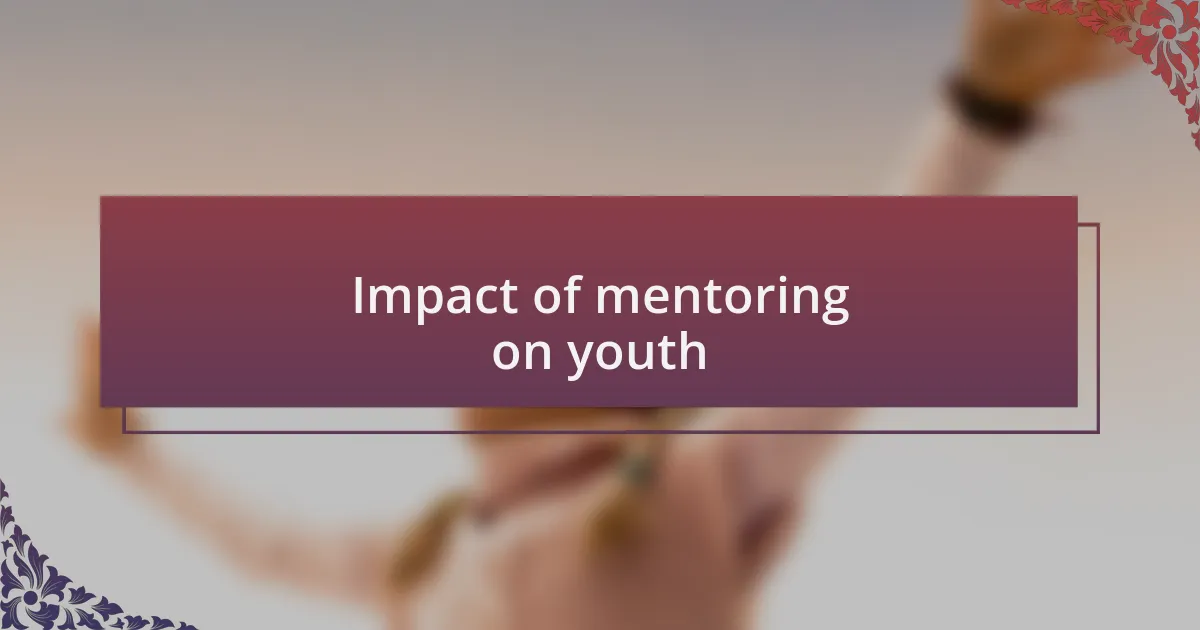
Impact of mentoring on youth
The impact of mentoring on youth is profound and far-reaching. I recall one young man I mentored who struggled with academic challenges. When he finally grasped a difficult concept after weeks of effort, the joy on his face was unforgettable. It made me realize how mentorship can ignite a spark of confidence in young minds. Have you ever witnessed a moment when someone realizes their potential? It’s transformative not only for them but also for a mentor.
Moreover, I’ve seen how mentoring cultivates resilience in youth. One of my mentees faced significant obstacles at home, yet through our sessions, he learned to channel his frustrations into creativity. Watching him create art as an outlet was a revelation. It led me to reflect on my strategies for overcoming hardship. Isn’t it interesting how mentoring can help youth find their voice, while simultaneously encouraging mentors to articulate their own experiences?
Lastly, I find that mentoring fosters a sense of community. There was a time when my group of mentees decided to volunteer together at a local shelter. Their enthusiasm and compassion created an environment of camaraderie that was both uplifting and empowering. I often think about how these shared experiences not only break barriers but also instill valuable lessons about empathy. How can we underestimate the power of collective action in shaping our youth? Each moment spent together reinforces the idea that mentoring creates a network of support that extends beyond individual relationships.
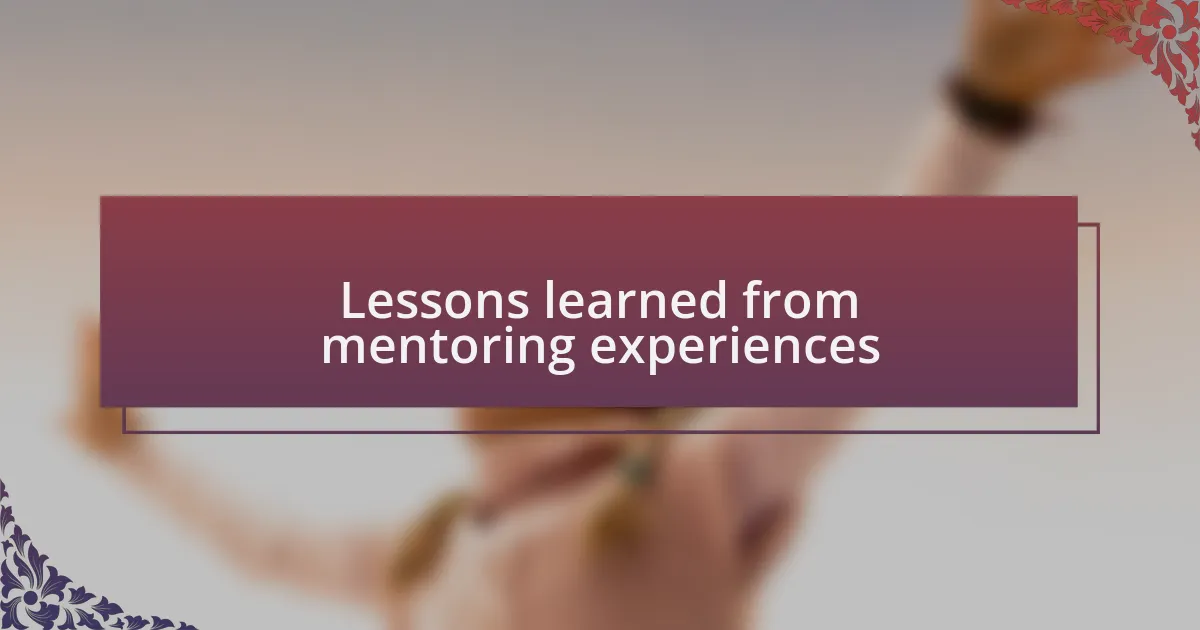
Lessons learned from mentoring experiences
One profound lesson I’ve learned from mentoring is the importance of active listening. I remember during a session with a young girl who seemed withdrawn. Instead of jumping in with solutions, I asked her to share her feelings about a recent challenge. When she opened up, I realized how much wisdom youth carry within themselves. It struck me: sometimes the best way to guide someone is simply to let them express themselves. Have you ever felt the relief that comes from being truly heard?
Another significant insight I gained is that vulnerability is a strength, not a weakness. I once shared my own struggles with a mentee who was navigating a tough situation. Seeing her reaction was eye-opening; she felt a sense of relief, knowing she wasn’t alone in her battles. This moment made me reconsider how sharing our flaws can create deeper connections. Isn’t it fascinating how showing our human side can encourage others to do the same?
I also discovered that mentorship is a two-way street. One of my mentees, passionate about technology, introduced me to a coding platform I had never tried. As I struggled with basics, I found myself inspired by her patience and excitement. It made me reflect on how much I gain from these interactions. What if every mentor approached their role as a learner, too? It’s incredible how the exchange of ideas can be just as valuable for the mentor as it is for the mentee.